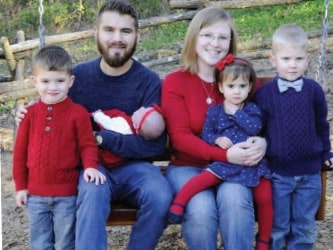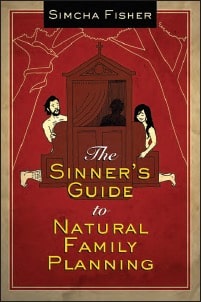Caitlin Lowery discovered natural family planning through Google. She and her husband, then newlyweds, wanted to boost their chances of conceiving quickly, and she stumbled upon BabyCenter.com message boards rife with women explaining how they were tracking their cycles trying to get pregnant. Fascinated — and a bit astounded that she had never learned this aspect of women’s biology — she joined an NFP-focused Facebook page. There she found fellow Catholics and first realized the Church had something to say on the matter. And that began what she described as a profound, vulnerable and sometimes confusing journey with NFP in her eight years of marriage.
“It’s really a beautiful part of creation that, sadly, many people either don’t know about or it gets shoved under a rug,” said Lowery, 32, a mother of four living near Austin, Texas.
But, as she and other NFP users attested, that beauty can mingle with frustration, fear and even loneliness as they strive to live out what is, for many, a demanding teaching. In the same breath, they describe it as rewarding yet difficult, empowering yet humbling, life-giving yet sacrificial. In embracing NFP’s paradoxes, Catholic couples say they’ve found not just a tool for trying to achieve or avoid pregnancy, but also a worldview that affects every facet of their marriage and family. But it doesn’t make it easy, and many are looking to the Church for more support.
Maria Wiering writes from Minnesota.
Asking the right question
In May 2017, Jenny Uebbing posted a question on her blog: What do you need from the Church to help you live out the demands of NFP?
It was addressed to the NFP-using women who had been pouring out their hearts in her comments box and Facebook page in response to an unsigned guest post written by Uebbing’s friend who admitted that sometimes she didn’t want to be “open to life,” but was grateful that NFP had taught her to trust that God knows what’s good for her better than she does.
But still, she said that openness isn’t easy.
“It’s hard to say and even harder to admit the hardness of my heart that wishes sometimes that I could say that I am ‘done,'” she wrote.
She continued, for more than 1,000 words, to outline her personal struggle with her fiat, her weariness in her battle against a human desire for control.
She suggested that, perhaps, it would be a bit of an easier cross for her to bear if all the rest of the NFP-using Catholics would stop grinning about it for a moment, and ‘fess up about their struggles, too, because then she wouldn’t feel outside of two camps — those of the world and of fellow Catholics.
Uebbing had unknowingly opened the floodgates. Within four days, the guest post garnered tens of thousands of views from Facebook and hundreds of comments.
Women shared the nitty-gritty of their private struggles: not being on the same page with their husband; feeling judged for not having enough children or for having too many; experiencing heartbreak over infertility; being postmenopausal and wishing for more children; fearing more children for health reasons or expense; and feeling overwhelmed by the children they have but unsure of where to find help and support.
Like the writer, many women expressed joy in embracing NFP but also frustration over feeling the need to toe the NFP party line — to act, for the sake of NFP evangelization, like using it was simple and straightforward, that it always delivered a “honeymoon period” each month during a couple’s infertile times, never resulted in unexpected pregnancies and always brought the husband and wife closer together.
Despite their frustrations, the majority of the women still seemed committed to practicing NFP.
Uebbing sifted through their comments and then asked them to share more.
And the responses came in droves.
Looking for support
Uebbing, 35, and her husband, Dave, came from families of six and seven kids, and they expected to have a larger family themselves. They never considered using contraception, but after having two children in three years, they decided to learn NFP. In the years since, they’ve had three more children, and they’ve learned other NFP methods. Uebbing calls what they do now “cafeteria NFP,” taking what they’ve found to work for them from the methods they know.
For Uebbing, who lives in Denver, Colorado, writing about NFP was a natural component of her blog, Mama Needs Coffee. She said she wasn’t surprised by the nature of the responses to the “what do you need” question, but she was surprised by the consistency of responses from around the country, as well as other parts of the world.
Many women lamented the lack of NFP resources in their parishes or local Church. Some asked for homilies affirming the goodness of children and their decision not to use artificial birth control. Other women asked for scholarships or childcare to help them attend classes. Others said they hadn’t heard of NFP in their marriage preparation courses, and they had to dig for information about it in the dark corners of the internet.
Some wives expressed real suffering, from having more children than they imagined while living on single incomes, and, in addition to financial strain, feeling ostracized by their parishes. Some said they felt abandoned by the Church as an institution — that while they were trying tooth and nail to live by her teachings, its leaders were more concerned about accommodating those who didn’t, when it came to marriage and sexuality. Some had wanted to read more about NFP in Amoris Laetitia, Pope Francis’ 2016 apostolic exhortation on marriage and the family. Of the document’s 325 sections, only one focused on family planning.
Uebbing heard from women who struggle to talk to their priests about their married sexuality in the confessional, and who wish their pastors better understood how it works so they could offer better counsel, especially for couples who struggle with chastity during extended periods of abstinence when fertility signs are unclear.
“I want my pastor not to look at me like I’m shocking and disgusting when I say in confession that my husband and I find it difficult to abstain for months on end and sometimes get into trouble,” one woman wrote. “I want anyone to actually share my distress at an unintended pregnancy instead of guilting me for not smiling about my blessings. I want everyone to stop acting like it’s always ten days of abstinence a month and perfect effectiveness, if you can find the right method.”
Honest assessment
Lowery can relate to some of the frustrations aired in Uebbing’s comboxes. She is enthralled by the way God made women’s cycles and how NFP cooperates with them, but she’s also experienced confusion in the postpartum phase, when a woman’s biological markers can be ambiguous.

NFP can look like “failure,” said Lowery, whose four girls are 6, 5, 4 and 2. “We have children that we didn’t plan to have, but I have to say, that in that ‘failure,’ I was able to truly understand what it means to be open to life, and I wouldn’t change it for the world.”
Sam Guzman, 30, a Catholic living near Tulsa, Oklahoma, acknowledged that NFP can put a strain on marriage, especially if the couple didn’t have realistic expectations for how it works. Meanwhile, men, he said, are often less likely than women to confide in each other about their struggles with NFP, especially if they’re not often having sex because of it.
In 2016, the father of four wrote a blog post for his site, The Catholic Gentleman, titled “I Hate NFP (But Need It Anyway),” where he described the dishonesty of NFP advocates pitching it as a “marriage-building tool” with no discussion of its challenges and the difficulty of extended abstinence, but also the virtues he’s seen NFP foster in himself, especially selflessness.
“I think we need to talk about the fact that this can be a cross sometimes. This can be something that demands something of you, and it’s not easy. It’s going to hurt a bit,” he told OSV. “If you pass it off as something that is only positive and has no drawbacks and no hardships involved, then you’re setting people up for failure and frustration and they’re going to start resenting Church teaching.”
The Church could better communicate the relationship between sacrifice and love, Guzman said. “I think it’s something we don’t understand very well.”
Between two camps
NFP users often find themselves in the crosshairs between Catholics who use contraception with no compunction — including those who feel theologically vindicated by perceived rejection of Humanae Vitae by the “sense of the faithful” — and Catholics who see it as little better than “Catholic birth control,” perceiving the users as having no trust in God’s providence.
After having her youngest child, Lowery suffered severe postpartum depression, and she and her husband got serious about using NFP to avoid pregnancy. While she’s gotten push-back from family members for not using contraception, she also experiences judgment from other Catholics for using NFP at all, she said.
“We’re lying if we say we haven’t looked at the couple in the front pew with no children and wondered, ‘Well, what are they doing?'” she said. “But the truth is that we have no idea. … I have heard so many stories of Catholic couples that are made to feel horrible for the sole purpose that we were told in Humanae Vitae that we’re supposed to use it with that discernment as a couple: for serious and just reasons. And I think it’s very important that we as Catholics remember that we cannot judge those just reasons for someone else.”
But statistically, NFP’s harder sell is to Catholics who are more likely to use contraception than nothing to plan pregnancy. However, as Guzman acknowledged, that has frequently meant an overselling of NFP’s potential benefits while skirting its challenges.
Uebbing said one problem is Catholic entities’ marketing of NFP as “99 percent effective” or “chemical-free,” appealing to contraception-minded Catholics. Though good intentioned, that approach leads to couples feeling frustrated when NFP doesn’t “work” for them, and they get pregnant when they were trying not to, or that practicing it correctly requires more attention and sacrifice than they were led to believe.
On one hand, she said, it’s not fair to sell NFP to 20- and 30-something Catholics who think they’re signing up for something simple. On the other hand, it underplays the rich teachings of the Catholic Church, which express an integration of sex, family, life and the dignity of the human person. She said that popular NFP marketing can be like promising a weight-loss drug, without mentioning that participants have to enter a comprehensive training program that regiments everything from eating to sleeping. Not to mention their sex life.
Integrated lifestyle
Some couples are left feeling duped and resent each other or the Church, even if they never leave it — and even if they’re still begrudgingly using NFP. And couples looking for a “solution” to their fertility will see contraception-using Catholics and be attracted to its ease. They’re not thinking about contraception’s long-term consequences on their marriage, Uebbing said.
“NFP is like a complete lifestyle,” she said. “Offering it as a kind of like ‘Church-approved panacea for too many children,’ it’s not fair. People come to that realization pretty early in their marriage if they’re using it to seriously avoid. I think a lot of couples walk away from the Church, even if they don’t physically leave, in their hearts, like a part of them closes down when they realize, ‘Oh, we weren’t really given the full picture.'”
Understood in the context of the Church’s teachings on marriage and family, NFP can be a tool for grace, dignity and healing, said Uebbing, who has begun work for the Archdiocese of Denver on enhancing its support for couples using NFP.

“When the Church really starts to sell NFP [well] is [as] an alternative worldview and a vision of God’s beautiful plan for humanity that is full of challenges and full of sacrifice and full of beauty, just like the Christian life,” she said. “That’s when we’ll start to win people over to it.”
Uebbing acknowledges that the trust NFP entails can be radical. She knows women who felt devastated by an unexpected pregnancy. Like Lowery, Uebbing struggles with postpartum depression, so she and her husband have developed a game plan to manage it, and her mental health is part of discussions around whether they should be open to conceiving in a given cycle.
And then there are the really hard cases, such as couples needing to prevent pregnancy for serious medical reasons and therefore abstaining for significant periods of time. Uebbing said she hears undercurrents suggesting that contraception should be tolerated in those extreme circumstances, but, without dismissing the gravity of those situations, she argues that the Church needs to be consistent in its teaching.
“Either contraception is bad for everyone’s marriage and it causes damage on a physical and spiritual and emotional level, or it doesn’t,” she said. “The Church has spoken really definitively on everyone’s marriage. Through Humanae Vitae, it has said, as difficult as this teaching is to receive, this is the truth, and the Lord loves us enough to present us with the truth.”
Letting go of ‘selling’ NFP
When Simcha Fisher wrote “The Sinner’s Guide to Natural Family Planning” (OSV, $10.95), she wrote the book that she had been looking for — unsuccessfully — when she was recently married and trying to be faithful to Catholic teaching on sexuality, she said.
At that point, now two decades ago, the writings she found on the topic were either too dry, theological and technical, or they didn’t dip below the surface of NFP’s benefits. While neither approach is “wrong,” she said, “I think that people often have a hard time synthesizing it and figuring out how do I get from point A to point B.”
The book has resonated with readers, said Fisher, 43, a writer and mother of 10 who lives in New Hampshire.
“A lot of people were just desperate for somebody to tell them that it’s normal not to be in love with natural family planning, because they felt like they should be in love with it, or that somebody had lied to them by telling them that NFP was going to be nothing but hearts and flowers. … There was a huge outpouring of relief that somebody was saying, ‘Yeah, it’s not fun.'”
It’s important for married couples to understand that no two marriages are alike, “and that’s a feature, not a bug,” she said. “It’s all right if your marriage doesn’t resemble … the slick pamphlet you got at your three-day pre-Cana presentation.”
“I think that a lot of time people expect their marriages to sort of fall into place instantly just because they’re doing everything right, and I wish people could just learn to be patient with themselves, to be patient with their spouses and to be patient with God,” she continued. “One of the reasons marriage is for life is because it takes a lifetime to figure out how to be married.”
Sexuality is not simple or easy, Fisher emphasized. “Sexuality is very beautiful, but it also can be very painful. And these things go together because everything in life is complicated to one degree or another.”
And, she added, as soon as couples think they’ve figured something out, often something in their life changes, and they have to begin learning all over again.
“People maybe don’t realize that your sexual relationship is something that needs to be constantly renewed, and it’s not going to be a matter of plugging in the right forms of obedience and then just reaping the rewards of it,” she said. “It takes a long, long time to develop things.”
It’s important that Catholics speak honestly about NFP and sexuality, Fisher said, instead of focusing on how well they’re “selling” NFP when they discuss it.
“When we’re teaching something as difficult as the teaching of Catholic sexuality in the very secularized, sort of pornified world we live in, it takes a lot of courage to be honest about natural family planning because it’s a hard sell,” she said.
“But what this does is it forces us to rely on the Holy Spirit more than ever, because when something is a hard sell but you know it’s true, then you realize very much that this is not about me, this is not about my salesmanship, this is not about my slick marketing. … It’s about opening doors so that the Holy Spirit can speak to people.”
Couples go out for regular date nights — at church
Ongoing marriage catechesis. Robust pastoral support. A parish-sponsored date night — with childcare. These were among the suggestions shared by respondents to blogger Jenny Uebbing’s 2017 request for ideas on what couples needed from the Church to help their practice of natural family planning.

In the Archdiocese of Washington, D.C., two archdiocesan offices collaborated this spring with a Bethesda parish to host a monthly night out for engaged and married Catholic couples that included appetizers, prayer and a speaker.
Some parishes are using John and Teri Bosio’s “Six Dates for Catholic Couples” program, based on the couple’s 2008 book, “Happy Together: The Catholic Blueprint for a Loving Marriage” (Twenty-third Publications, $16.95) or other out-of-the-box materials.
Others, such as St. Theresa in the Houston suburb of Sugar Land, Texas, have created their own formula for a successful series. In its ninth year, each monthly “date night” event draws 160 to 180 people, and it is also open to singles. It includes drinks, dinner and dessert; a short catechetical video (such as a selection from Bishop Robert Barron’s Word on Fire Catholic Ministries); and socializing, with free childcare. The parish requests a $10 donation per adult.
“They [the date nights] started because we wanted something for couples to go to where they could be social and they could also have a good time and share their faith,” said Gabriel Castillo, St. Theresa’s promoter of evangelization, who organizes the events.
Castillo knows that the cost of childcare, especially for the parish’s larger families, can make date nights difficult for some couples. “We want people to have the opportunity to come out and not have to worry about their kids,” he said, noting that free childcare is a huge draw, and the children have a great time, too. “[Couples] love it, and the funny thing is, the kids like it more than the adults … because they get to see all their friends, and they get free time to run around and get ice cream.”
One of date nights’ strengths is the wide age-range of attendees, Castillo said, and the events aim to meet people where they’re at, so that couples feel welcome even if one spouse attends Mass and the other doesn’t. “We have had several people join the Church or return to the Church after having come to date night,” he said.
Castillo and his wife of 10 years attend with their three children, ages 1 to 10. He said he recommends other parishes consider hosting a regular date night, even quarterly. “It’s the most successful and the best parish-building activity that we have,” he said. “It’s hard to get young families involved in stuff because they’re so busy with their kids, and this is a great opportunity to do that.”
Debunking the myths
Fifty years after Paul VI wrote Humanae Vitae, condemning the use of artificial contraception and promoting natural family planning, NFP is still not always understood. Here are some common myths countered by reality of using NFP provided by the U.S. Conference of Catholic Bishops:
MYTH
NFP does not allow for sexual spontaneity.
REALITY
Modern culture is awash in sexual messages. This may fool us into thinking that “everyone” is having sex as often as possible and always “spontaneously!” The reality is that most marital sexual encounters are planned, or at least happen in situations favorable to love-making that are set up by agreement regardless of the family planning method used. For NFP couples trying to postpone a pregnancy, such an invitation in the days of sexual abstinence can mean living a “chaste courtship” that will be followed by a “mini-honeymoon.” This is not to say that times of abstinence are not challenging. They can be! Such self-mastery fosters authentic freedom where one’s desires are put in service to the other–a necessary ingredient for marriage! Real sexual spontaneity depends upon real freedom — and NFP fosters such freedom.
MYTH
NFP can be used only by women with regular cycles.
REALITY
NFP works with menstrual cycles of any length and any degree of irregularity. NFP allows a woman to understand the physical signals her body gives her to tell her when she is most likely to become pregnant (around the time of ovulation). Once the woman understands this information, she and her husband can use it according to their family planning intentions (i.e., to either achieve or postpone pregnancy). When special circumstances occur (e.g., stress, illness, breastfeeding, post-miscarriage, perimenopause, etc.), NFP instructors can provide additional guidance in interpreting signs of fertility.
MYTH
The Catholic Church does not want married couples to have sex just for pleasure.
REALITY
Sexual pleasure in marriage is good. Pleasure is a part of intercourse, however, not its sole focus. There is a difference between simply “having sex,” which includes actions aimed at one’s own pleasure, and “making love,” which involves giving oneself to another. “Making love,” as God planned it for marriage, means that husband and wife offer themselves to each other as a gift. This sexual gift is faithful and exclusive, and has the potential to build a family. In expressing the mutual love and commitments of husband and wife, sexual intercourse becomes a lasting source of joy in the marital relationship.
Source: “NFP, Myth and Reality” available in English and Spanish from the U.S. Conference of Catholic Bishops. To order, email customerservice@ifcweb.com.
Learn more
Many dioceses offer or require classes in natural family planning as part of preparation for the Sacrament of Marriage. For more information on NFP and its various methods check with your diocesan office or one of these organizations:
Couple to Couple League: https://ccli.org
Billings Ovulation Method Association USA: https://www.boma-usa.org
Pope Paul VI Institute: https://www.popepaulvi.com
Natural Family Planning Outreach: https://www.nfpoutreach.org
Family of the Americas Foundation: https://familyplanning.net
Natural Family Planning International: https://www.nfpandmore.org
Fertility Appreciation Collaborative to Teach the Science: https://www.factsaboutfertility.org
One More Soul: https://onemoresoul.com



